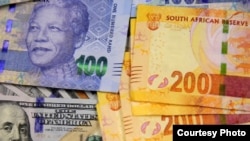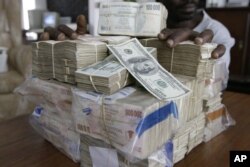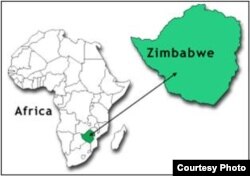Some Zimbabweans say President Robert Mugabe’s government should embark on key policy shifts, especially on the controversial black economic empowerment program compelling foreign-owned companies to part with majority shares, in order to revitalize the ailing economy.
This call comes at a time the International Monetary Fund (IMF), which recently concluded Staff Monitored Program consultations in Zimbabwe, says the country remains in debt distress, should reduce the huge wage bill, and economic activity is severely constrained by tight liquidity conditions resulting from limited external inflows and lower commodity prices.
It further says drought and increasing temperatures have reduced agricultural output and disrupted hydropower production and water supplies.
Zimbabwe this week revised downwards its economic projections from 2.7 percent to 1.4 percent due to the current harsh economic environment in the country.
Following the introduction of a controversial land reform program in 2000, Zimbabwe’s economy has never shown any meaningful signs of sustained growth, except between 2009 and 2013 under a unity government, which adopted multiple currencies like the United States dollar, South African rand, Botswana pula and several others.
ABANDONED ZIMBABWE DOLLAR
The country abandoned its local dollar that was hard-hit by historic hyperinflation rates but indications are that this alone cannot save the fast-declining economy.
Sixteen years after the agrarian reforms were implemented; followed by the country’s adoption of the Indigenization and Economic Empowerment Act designed to transfer the economy into the hands of indigenous black people, some locals like Barnabas Thondlana, say Harare now needs to come up with policies that promote foreign direct investment.
Thondlana, a newspaper publisher and editor, says the black economic empowerment is one of the current policies that ought to be reversed because it is scaring away potential investors.
But Indigenization Minister Patrick Zhuwao is on record saying the government would not backtrack on its indigenization plans that compel foreign owned businesses to transfer at least 51 percent of their shares to black Zimbabweans.
Harare resident, Mushoriwa Mbewe, echoes Thodlana’s views, adding that the government has to change course and embrace policies that fit into the global economy.
Tinashe Gumbo, programs officer of the Zimbabwe Coalition on Debt and Development or Zimcodd, agrees, adding that Zimbabwe should urgently deal with its external debt of nearly $10 billion in order to get fresh lines of credit from international finance institutions like the IMF, World Bank, Paris Club and others.
Gumbo says it is also critical for the government to ensure that there was transparency and accountability once new resources were availed.
Thondlana further argues that the El Nino-induced drought has had a debilitating effect on the local economy, adding that the farming community now needs external support.
CORRUPTION AFFECTING ALL SECTORS
According to Obert Gutu, spokesperson of the MDC formation led by former Prime Minister Morgan Tsvangirai, the government also needs to deal with corruption that has crippled the public and private sectors.
He says there is need for President Mugabe’s government to ensure that the country’s domestic and external debt does not balloon.
Economist Trust Chikohora, who is also the general secretary of the Renewal Democrats of Zimbabwe led by Elton Mangoma, believes that governance systems in the country also need to be revamped to ensure economic growth.
For his part, President Robert Mugabe has blamed the country’s poor economic performance on restrictive measures imposed on him and his inner circle by the West for alleged human rights violations and election rigging.
But his Finance Minister Patrick Chinamasa, says the time for a blame game is over and Zimbabwe has to work hard to get the country’s economy out of the woods.
DEBT RECOVERY STRATEGY
Chinamasa says Harare is working hard to rebuild its tattered image in order to get Zimbabwe back into the family of nations. Already Harare is re-engaging the European Union with a view of normalizing its relations.
On the other hand, international money lending institutions have not been giving Zimbabwe any financial assistance but government says it is working on a debt recovery strategy that may see it getting fresh lines of credit if approved by the IMF, World Bank and others.
The IMF says Zimbabwe needs to address underlying impediments to economic growth as soon as possible and re-direct the economy towards private sector-led growth.









